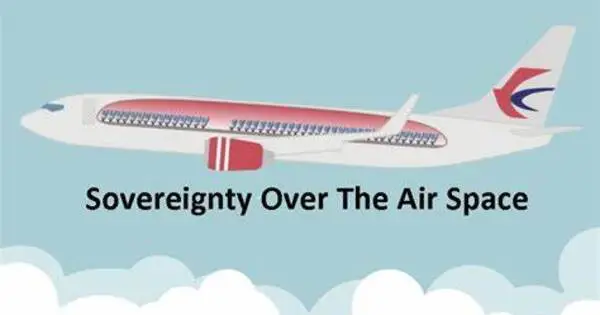Air sovereignty is the inherent right of a sovereign state to regulate the use of its airspace and enforce its own aviation legislation, in extreme cases by using fighter aircraft. It refers to a country’s control and power over the airspace within its borders. International law does not specify the top limit of national airspace. It is a vital part of national sovereignty that is governed by international laws and agreements.
Here are some key points related to air sovereignty:
- Control of Airspace: Air sovereignty is the unique right of a country to regulate and control the use of its airspace, including the capacity to manage air traffic, impose security measures, and monitor activities within its airspace.
- National Defense: It is inextricably linked to a country’s ability to defend its airspace. This includes the capacity to intercept and respond to any unlawful or potentially dangerous aircraft entering its airspace.
- International Agreements: While nations have sovereignty over their airspace, they also engage in international agreements that create airspace laws and procedures. The 1944 Chicago Convention is a fundamental international treaty that oversees the concepts and norms of airspace sovereignty and air transport.
- Rights of Innocent Passage: While nations have the right to control their airspace, international law also recognizes the concept of “innocent passage.” This means that civilian aircraft from other countries are generally allowed to fly through another nation’s airspace without prior permission, as long as they do not pose a threat to national security.
- Airspace Sovereignty and Outer Space: The boundary between airspace and outer space is not precisely defined and can vary from one country to another. Nevertheless, nations maintain sovereignty over the airspace above their territory up to a certain altitude, typically defined by international agreements or national laws.
- Military Operations: Air sovereignty is crucial for military operations, including surveillance, reconnaissance, and the interception of potentially hostile aircraft. Nations often establish air defense identification zones (ADIZ) to monitor and respond to aircraft approaching their airspace.
Air sovereignty can be violated in a variety of ways, including the unauthorized arrival of military planes, drones, or spy planes. Such incidents have the potential to spark diplomatic tensions or even armed retaliation. Air sovereignty, in addition to military considerations, is important in civil aviation. Nations have the authority to regulate air traffic, create flight routes, and ensure civilian aircraft safety in their airspace.
To summarize, air sovereignty is an important component of a nation’s sovereignty because it includes authority over its airspace as well as the power to manage and protect it. While nations have the right to assert their air sovereignty, they must also comply with international accords and conventions in order to promote peaceful and safe international air transport.
















